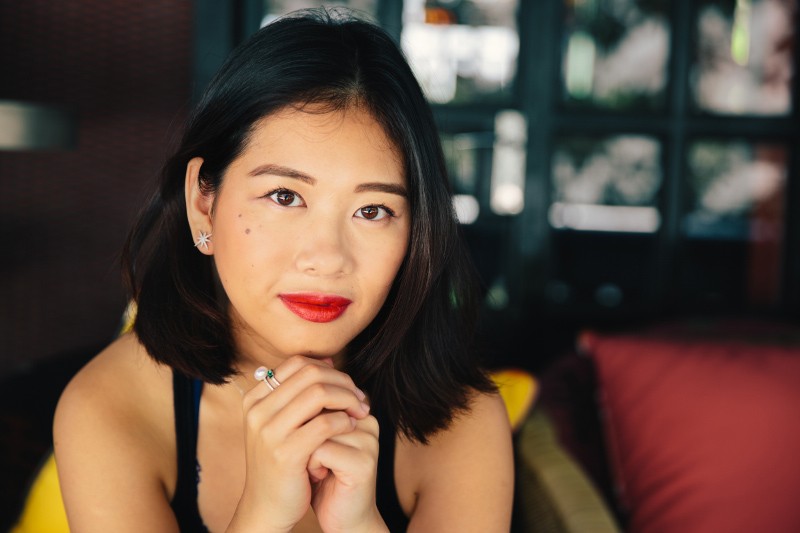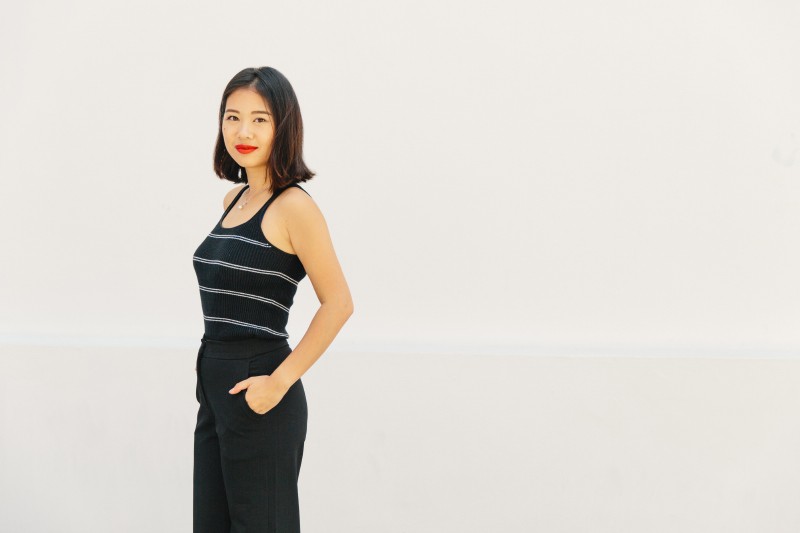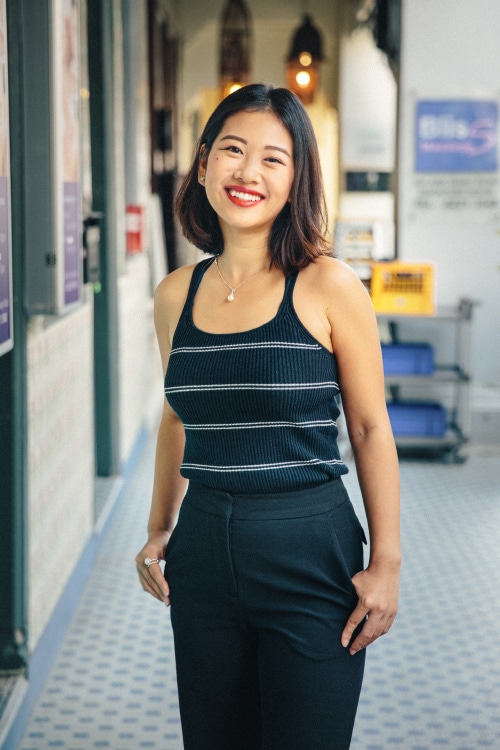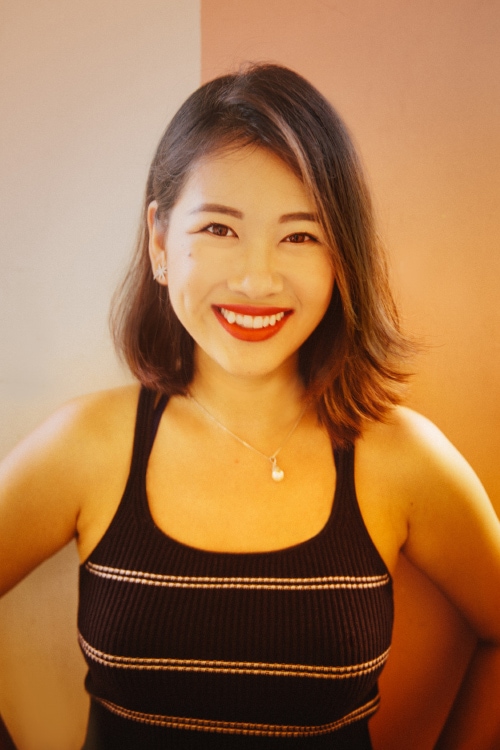Pocket Sun: The Sky's The Limit
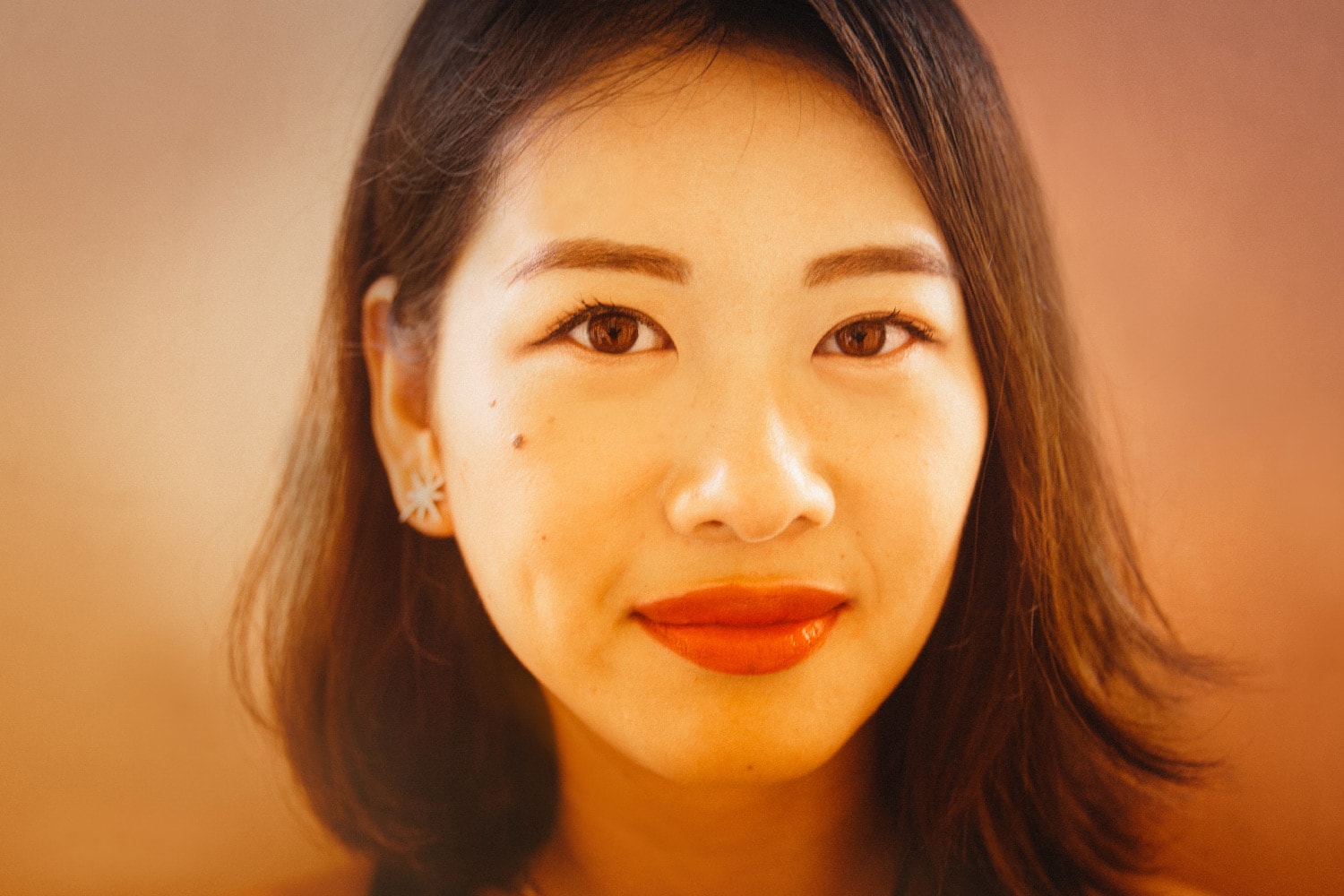
At first glance, Pocket Sun comes across as the typical cosmopolitan millennial, dressed in a pair of classic black pants, striped top and heels with a touch of bright crimson on her lips. Her social media feed is a vibrant collection of travels and food, as well as photographic portraits of herself. Yet, if you do a quick Google search, there are countless articles on Pocket—even an appearance on the March cover of Forbes Asia. This past year has been her year, and this 25-year-old, who now lives in Singapore, is poised for international stardom. “People look at me and think, who is this girl and what is she doing in venture capital?” says Pocket. “Being different from what they expect is my biggest advantage.” Pocket is a rare force of nature who has carved out a blazing path for women and those who do not fit the stereotypical VC mould. Many would be fazed in an industry where women decision-makers make up a single digit percentage. There are daunting challenges to overcome, from micro-aggression and social capital limitations to institutional barriers. “If I had followed the norm and believed there was only a certain type of venture capitalist, I would’ve never become one. You create your own norm because what works for others may not work for you. If you don’t believe in yourself, nobody else will.” Today, Pocket has funded 20 businesses with her US-based co-founder [Elizabeth Galbut] and hosted entrepreneurship events and competitions around the world. Her SoGal community is made up of more than 10,000 members from over 20 countries. Perhaps, it is the way Pocket carries herself with an absolute self-assurance that draws others towards her, or her steady gaze which invites an observer's confidence. Or maybe it is the way that she articulates with deliberation, making one lean in to listen—so close you can almost hear her rapid mind spinning, always adapting, always responding. But no matter what, you won’t forget meeting her easily, because the conviction in her eyes tells you that she is someone who is going to change the world, one way or another.
XIANGYUN LIM: Women’s entrepreneurship has hit a media tipping point. Do you think it reflects a temporal trend or a fundamental shift?
POCKET SUN: I don’t think it’s a phenomenon that will stop. Women are taking the lead even in top governmental positions globally and our next generation of daughters won’t think it’s impossible to be the president—isn’t that amazing? There are many more female role models now, which is something women need more than men because we tend to underestimate and limit ourselves. I never thought I’d be an entrepreneur before hitting 30, but role models help you realise that you have an untapped potential; it makes you think of the role you want to play in society. The media helps to raise awareness about how women are treated in the society and how social expectations should change. Men also understand better how they can be more supportive of their partners, which gives women more flexibility and freedom to pursue things.
XIANGYUN: What do you think is holding VCs and angel investors from investing in women entrepreneurs?
POCKET: There’s a lack of understanding. There are few female decision-makers in venture capital, which leads to a knowledge gap because men can’t resonate with products that deal with feminine issues. Female entrepreneurs also have a different approach in terms of how they run their company. These are some fundamental differences. Women tend to be more private and we don’t hear from the few who have successfully raised venture capital—it’s usually men talking in conferences, which is why there isn’t much information out there that can close this gap.
XIANGYUN: Why are there so few women in the first place?
POCKET: Venture capital in the U.S. pretty much started in Silicon Valley during the Mad Men era when not many women were even in the workplace. The industry has remained very small with only a fewer players managing a ton of assets. It’s almost impossible to get a job in venture capital, and this means the network never really grows or expands. We need diversity and that includes women and minority groups; we want all kinds of problems to be solved. Not just those of middle-aged men. The current pool of investors come from very similar backgrounds with a particular outlook of the world, which leaves behind whatever is outside of this spectrum.
XIANGYUN: And SoGal Ventures is here to disrupt the industry.
POCKET: Yes. Although Elizabeth and I don’t fit into the usual VC profile, we believe in investing in non-traditional entrepreneurs and running our firm in a cross-border way.
XIANGYUN: Why the emphasis on being cross-border?
POCKET: Being hyperlocal isn’t the future. The world is getting smaller and more connected, and you’re no longer defined by where you were born. We’re all becoming global citizens. Moreover, being based in both the U.S. and Singapore allow us to see the world from two locations. We can gather knowledge from two ends of the world to share with entrepreneurs, and that’s important for them to think globally.
XIANGYUN: How many companies has SoGal invested in?
POCKET: We’ve invested in 20 companies thus far.
XIANGYUN: What is your investment philosophy? Do you look more at the company or the founder?
POCKET: It’s a complicated and comprehensive evaluation of what is presented to us. There are not many numbers to analyse because we invest in early-stage companies. This means we don’t just invest in an idea—there should be a product that has a solid working prototype with some initial market traction. And of course, the people matter a lot.
If you close yourself up, you’re going to fail.
XIANGYUN: I heard the process is more of an art than a science, and there’s no specific formula.
POCKET: Yes, I do think so. It’s more than just the due diligence and procedures of evaluations—it’s the chemistry and magic that happens when two or three people meet and are able to connect. SoGal’s strength is not just in capital and we want to play a role in the companies we invest it, which makes the personality fit very important. We have to be able to communicate with the entrepreneurs. It’s a subtle balance because they need to trust our suggestions, yet not take what we say at face value. As an investor, I want entrepreneurs to trust their instincts but still keep an open mind. The world is so big and there’s so much you don’t know. If you close yourself up, you’re going to fail. I think that’s a very important quality for an entrepreneur.
XIANGYUN: What else do you think is important for entrepreneurs?
POCKET: They have to believe that “I can do anything I want, I can make myself into the person I want to be; I can redefine my future and I am the master of my life”. It isn’t about having a company but the mindset.
XIANGYUN: Do you think the qualities of an entrepreneur are more apparent in males?
POCKET: No—women need to give themselves more credit! There’s research supporting that women are indeed risk-takers, and they outperformed men in 12 out of 16 qualities that make a leader. Still, people tend to choose leaders who are more aggressive and possess alpha male physical features—for example, someone who has conviction, a strong voice and facial structure—even when these things have nothing to do with being a good leader.
XIANGYUN: What do you think female entrepreneurs can bring to the table?
POCKET: A lot actually: how we process information and formulate ideas, our experiences and interactions, leadership style, and the ability to make things happen… women bring a different point of view. And they are generally less aggressive which can be good or bad depending on the situation.
XIANGYUN: Do you see yourself as more of a leader or an entrepreneur?
POCKET: Both. I’m a daring visionary and a relentless executor.
XIANGYUN: Yet you’ve shared that you never planned to be an entrepreneur. What was previously on the cards?
POCKET: My childhood dream was to become a music producer—I’ve played the piano for 18 years. I still love music passionately and may start pursuing it one day. After I graduated from College, I was very content with the stable lifestyle working at a big company until I found out that I couldn't work in the U.S. due to the visa lottery. Instead of going back to China to look for another job, I decided to go to grad school and study entrepreneurship—and that changed the course of my life.
If what you’re saying is powerful, they can’t ignore you.
XIANGYUN: Have you felt the need to make up for certain qualities in this male-dominated industry?
POCKET: Yes, of course. I am young and some might even think that I am too young to be in venture capital or to start my venture capitalist firm. But I know I’m able to convince people and earn their respect by knowing my stuff. If what you’re saying is powerful, they can’t ignore you.
XIANGYUN: How were you able to turn ‘being female’ and ‘being young’ to your advantage?
POCKET: I’m doing a TEDx Talk in October and the theme is on how deviation from the norm can be your best asset. I am a woman, young, Chinese, and speaking English isn’t my first language, but that makes me more memorable, and most of the time, underestimated. People look at me and think: Who’s this girl and what is she doing in venture capital? Being different from what they expect is my biggest advantage. Also, that means I can attract a different set of people and talk to entrepreneurs in a way that others can’t. I provide a different kind of value.
XIANGYUN: The deviation from the norm can be a motivation to cross it, close that gap and surprise people. Is that your motivation—to change people’s perceptions?
POCKET: If you just do what everyone else does, you can’t expect extraordinary results. Being crazy is about seeing the world in a different way—it’ll be so boring if everyone saw the world the same. How would we drive innovation? How can we push the world forward and think of better solutions to solve problems? Sometimes it takes a crazy person to drive new thinking and change the world a little bit. The entrepreneurial spirit has changed me and through other entrepreneurs’ stories, I have learnt conviction, determination, and how they created something out of nothing. You need to take initiatives because you can (to a large extent) control what happens around you and even turn things around to your favour. If I had followed the norm and believed there was only a certain type of venture capitalist, I would’ve never become one. You create your own norm, because what works for others may not work for you. If you don’t believe in yourself, nobody else will.
You have to be crazy; you can’t succeed as an entrepreneur without that edge.
XIANGYUN: Is it a scary path?
POCKET: Yes. It was really scary. I did not want to talk to people in the beginning because I knew they were going to react in a certain way. And I don’t blame them because that’s how they view the world. But that could also change, and down the line, people might say: ‘I knew she was going to be successful’, instead of: ‘She’s crazy to do what she wants to do’. A common thing I hear from entrepreneurs is how everyone thought they were crazy to do what they were doing—and that’s how you know it’s a good story. You have to be crazy; you can’t succeed as an entrepreneur without that edge.
XIANGYUN: Definitely. It’s not something that’s easy and you have to be obsessed and even give up certain things along the way just to pursue what you believe in.
POCKET: Exactly.
XIANGYUN: Is it a lonely journey?
POCKET: Definitely. Entrepreneurs are quite a special group and you’re not going to find them easily. Sometimes you do feel like you’re doing amazing things but nobody understands, especially when you’re responsible for everything you’re creating. Sometimes you don’t even know who to ask questions to, or who to talk to when you are being screwed over by your vendor—you can’t talk to your employees, you can’t talk to your mentor because he or she might not have the expertise in that area, and you can’t talk to your investors because it might cause them to pull out their investments… it’s tough. You have to find allies, so people join the SoGal group or come for events because they feel a sense of belonging. Having a co-founder is really comforting too. My relationship with Elizabeth is really important—we both admire each other’s capabilities, and we encourage each other. It’s a very healthy process.
XIANGYUN: Were there any people or experiences that strongly influenced you?
POCKET: I used to be stuck in a mould, but meeting different people makes you realise that everyone has their own paths; no one has the right to judge other people’s choices. So I hate it when people write articles like “young people should not enter venture capital” or say that it has to be a certain way—that’s bullshit. Venture capital needs values from all walks of life. Having invested in companies that have exited before doesn’t make you a good venture capitalist.
XIANGYUN: How would you like SoGal to be remembered?
POCKET: Right now, we’re one of the most known communities for diverse entrepreneurs and investors. Our main demographic is millennial women and our goal is to influence the next generation, and redefine what an entrepreneur looks like. We need new faces—it can’t always be Mark Zuckerberg. We’re building the potential of the next generation of entrepreneurs through exposure before they make their first career decisions; we want to have a reputation for being genuinely helpful to entrepreneurs.
XIANGYUN: Has childhood played a big part in shaping who you are?
POCKET: I was raised like a boy in my family and most of my childhood friends were male, which made me more adventurous and outgoing. It was only in my second year of middle school when I decided that I wasn’t one of the boys and I decided I was going to be a girl. Learning English was a huge turning point for me. I attended a summer programme in elementary school with students who were much older than me. I was initially discouraged by the age gap, but by the end of the camp, I felt I had learned things that no one from my grade would know, which gave me a lot of confidence. I’ve also loved reading from a very young age and that has helped me to understand the world. I read a lot of different things, even books on child education. [laughs] I even instructed my mum on how I thought she should educate me from a book I read in fourth grade. I think my thoughts were always more mature than others.
XIANGYUN: How about college in the U.S.?
POCKET: It wasn’t easy. My self-confidence was destroyed because my English wasn’t as good as my native-speaking friends. I was also worried I’d do something wrong or have people think I was too "fresh off the boat". I was an outsider and was afraid of making mistakes or being a fool. I had so many insecurities and that period was painful. I wasn’t used to teamwork too—the education system in China makes you comply and conform. You’re supposed to do whatever the teacher wants you to do and give standard answers. There’s no room for critical thinking, developing your own interests or even creativity. There is no room for even public speaking because there are too many people in one class!
XIANGYUN: How many on average?
POCKET: 60, even 70. If you have questions, you don’t raise your hand in class—you go to the teacher’s office after your class ends.
XIANGYUN: What do your parents think of what you’re pursuing now?
POCKET: It fluctuates. They didn’t take it seriously in the beginning since I was still a student. But when I was about to graduate, they wanted me to get a stable job. They had a lot of concerns and didn’t really understand what I was doing and how it could make money. They also don’t understand gender disparity issues because they have just accepted them. But when they saw the momentum I’ve gathered, how I work day and night, the people I’ve helped, the events being organised and the press that I get… they’re like: “Great, do what you do.” They still think stability is the most important thing, but that’s the last thing I want.
You need to understand that not everyone can understand you.
XIANGYUN: Do you try to explain SoGal’s intention to them?
POCKET: Yes. I really want them to understand. I’ve always had a great relationship with my parents, but we had a fight when my dad thought that championing for gender equality was not something I could do even if I died trying, because he didn’t believe it would happen in my lifetime. I was really sad. But I also realised that everyone has their limitations—they grew up in a very different environment and I can’t expect them to understand everything that I have experienced, just like how they can’t expect me to understand everything they’ve been through. I try, but you need to understand that not everyone can understand you. If they do, you’re probably not doing something really significant.
XIANGYUN: Why do you say that?
POCKET: I say that in the entrepreneurial sense. If you’re doing something that everyone thinks is great from the start, then why hasn’t anyone else done it or why haven’t they succeeded? There must be something you’re overlooking. Companies like Airbnb and Uber weren’t well-received from the start. That’s why I think something’s wrong if everyone gets your product and think it’s great immediately.
XIANGYUN: Have you met with problems you can’t solve?
POCKET: I have a growth mindset. If there’s something I can’t do now, I will figure it out later, or I will find someone to help me figure it out. I don’t think there are deadlocks. There are always things you can do about it.
XIANGYUN: Have you ever done anything that wasn’t quite yourself but was necessary?
POCKET: Not that I can think of. [pauses] I like to push my boundaries. I used to be very uncomfortable with public speaking—it was one of my biggest fears in college and even in business school. But I was a nobody when I just started and had to sell myself every single day. It was really hard to get a job being an international student, and I had to go to all these networking events, hand out my cards and talk about myself. At that point, I was almost going to give up and return to China. I was pretty discouraged and thought I wasn’t good nor qualified enough to compete with native speakers. So I decided to do something fun before I left—and that was how I got into sales. I always liked fashion and lived close to department stores. I had no sales experience nor fashion-related experience, and I wasn’t sure whether I could do it, but I printed a bunch of my resumes and asked them to call me. And they did. After two or three interviews with brands like Gucci, Kate Spade, Michael Kors… you know pretty well what they want. That’s how I understood that practice makes perfect. You go for an interview, quickly absorb information and use that as leverage for your next one. And I got really good at it [laughs]. I topped the sales in the first week that I was at Louis Vuitton. Once you get your feet in, you can become knowledgeable in something very quickly. It was interesting to learn about customer behaviour and the psychology behind their purchases.
I’ll be your daughter’s role model so that she can pursue whatever she wants in life.
XIANGYUN: So, how would you pitch yourself to the world in a sentence?
POCKET: I’ll be your daughter’s role model so that she can pursue whatever she wants in life.
XIANGYUN: Finally, I’m going to give you a phrase and you must complete the sentence.
POCKET: An entrepreneur defines… courage and hustle.
The values I hold dear are… diversity and equality. And that everyone has the power to change the world around her/him.
The past two years have been… unexpected and AMAZING!!
Ten years later… I’ll be on the Midas list as one of the best investors in the world.
Something about me that may surprise people is... I don’t know how to drive.
When things aren’t going the way I want them to, I… deviate from the norm.
The advice I’d give my younger self is… to have more confidence in myself.
What keeps me going… my full-hearted love for the world and hope for the future.
Empowerment… is enabling others to make better assumptions in life. For example, you can make a difference in the world.
The question I find myself asking the most is… should I eat this?
I convince someone by… my chutzpah.
When I’m not working, I… think about work.
The person I really want to meet… is a potential investor for my SoGal Ventures fund.
If I’m stranded on an island without access to technology… I’ll start making new friends.
What most defines me is… my determination and capability to make positive changes.
"天時地利人和”... is where I am right now.
My biggest fear is that… I will die before I accomplish my goals.
I want to be remembered as... a pioneer and a woman who inspired generations.
****
Edited by Wy-Lene Yap
